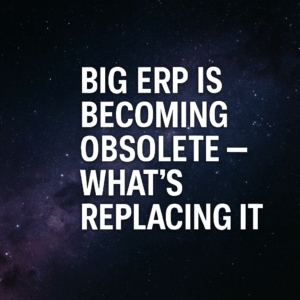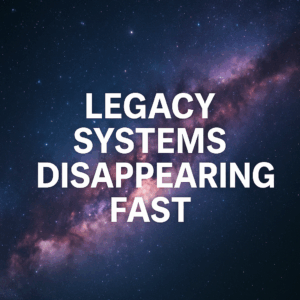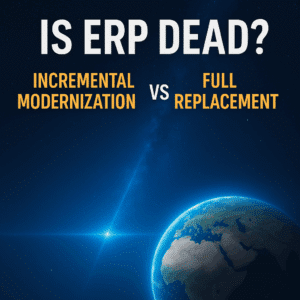Author: Eric Kimberling
I’m Eric Kimberling, the CEO of Third Stage Consulting. Today, we’re delving into who is to blame for digital transformation and ERP Implementation failures.
What are the real sources of blame in an unsuccessful or failed digital transformation? Whose fault is it? It can be for a myriad of reasons, but today I want to unpack and demystify some of the common factors and themes that can contribute to this unfortunate situation your organization could find itself in.
Further if you would rather watch a video on this topic, you can check out my latest youtube video:

Table of Contents
ToggleWho is to Blame in Digital Transformation Failures?
In the realm of digital transformations, when projects encounter challenges or setbacks, it’s not uncommon for stakeholders to engage in a flurry of blame. The landscape becomes crowded with accusations as customers, implementers, software vendors, and third-party systems are all thrown into the mix. Each party may point fingers at the other, creating a tangled web of accountability.
This blame game isn’t just about assigning fault; it’s a reflection of the inherent complexities and uncertainties that accompany digital transformation initiatives. It’s a natural response to the frustrations and tensions that arise when expectations aren’t met, deadlines are missed, and deliverables fall short.
However, amidst the chaos of finger-pointing, there lies an opportunity for introspection and learning. By unraveling the layers of blame and dissecting the root causes of project distress, organizations can gain valuable insights into the challenges they face. This deeper understanding enables stakeholders to develop more effective strategies for managing and mitigating blame in future projects.
The Implementer’s Dilemma
It’s a classic scenario: when a digital transformation falters, the implementer often finds themselves squarely in the firing line. But is it fair to lay the blame solely at their feet? While they may bear some responsibility, it’s crucial to acknowledge the mutual accountability shared between implementer and client. Assumptions, oversight, and active involvement from both parties play pivotal roles in project success or failure.
The Burden on Project Managers
Another frequent target for blame is the project manager. Charged with overseeing the day-to-day aspects of the project, they often find themselves in the hot seat when things go awry. Yet, the complexities of digital transformations extend far beyond their purview. Unrealistic expectations, ambiguous directives, and inadequate support from executives can hamstring even the most capable project manager.
Vendor Accountability vs. Customer Adaptability
A recurring theme emerges when software vendors or implementers absolve themselves of responsibility by blaming customers for their reluctance to change. While customer resistance can indeed impede progress, it’s imperative to recognize that one-size-fits-all solutions rarely exist. Software vendors must resist the temptation to adopt a holier-than-thou stance, acknowledging the unique needs and nuances of each customer’s business.
Integration Challenges and Third-Party Blame
Integration woes often serve as breeding grounds for blame, especially when third-party systems enter the equation. Rather than accepting accountability, vendors and implementers may deflect blame onto these external components. However, true resolution lies in a nuanced understanding of system interoperability and proactive problem-solving.
Embracing Responsibility for Successful Transformations
In the midst of the blame game, it’s easy to lose sight of the ultimate objective: achieving digital transformation success. Rather than fixating on assigning blame, organizations must focus on identifying root causes and implementing effective solutions. Collaboration, communication, and a shared commitment to project success are essential ingredients for navigating the complexities of digital transformation.
Conclusion:
In conclusion, I am trying to shed a light on the intricate dynamics of blame in digital transformations. By delving into the challenges faced by stakeholders – from customers and implementers to software vendors and third-party systems – we gain a deeper understanding of the complexities inherent in these initiatives.
Key takeaways include the importance of collaboration and accountability in navigating the blame game, as well as the need for proactive problem-solving and effective communication. Rather than assigning fault in a binary manner, stakeholders must work together to uncover root causes and develop strategies for addressing them.
The journey of digital transformation is one of continuous learning and adaptation. By embracing transparency, fostering a culture of collaboration, and leveraging collective expertise, organizations can overcome challenges and drive sustainable growth and success in today’s rapidly evolving digital landscape.
I invite you to share your thoughts and experiences on who is to blame in digital transformation and ERP implementation failures on my youtube video. I love hearing what your opinions and comments are on this topic.
How can we help?
If you need expert guidance on your organization’s digital transformation journey, Third Stage Consulting is here to help. Reach out to us today to explore how our consulting services can optimize your ERP implementation and drive strategic success.





